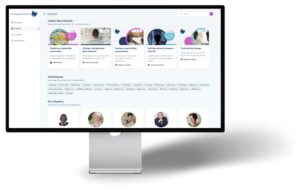The Impact of AI on Change Management and How to Stay in the Loop
Written by Melanie Franklin
AI is changing how we work in all areas. Increasingly, we are using tools to write emails, create checklists, summarise documents and create agendas. In this insight, I’ll be diving into the impact of AI on Change Management and how we can utilise it for success.
Every time I use AI to help me get part of my job done, I identify other ways I can use it, so my pace of adoption increases every day.
Interestingly, I have not noticed any time savings. My experience so far is that I use AI to help me prepare communications, and then I use the time saved to do additional work that improves my relationship with my stakeholders. It is helping me achieve more, but my To-do list is not getting any smaller.
If you’re finding yourself in a similar position, I’d like to hear your thoughts. Why not join me on the 19th of June for a free webinar – register even if you cannot attend live then you will be sent the recording.
The Impact of AI on Change Management – 3 Top Affected Areas
After attending a conference on AI in Dubai last month, I came away with more ideas for the impact of AI on Change Management could be long term. I don’t know if some of these are fantastical or if I am predicting the future, which will arrive very soon. Have a read and make up your own mind – Don’t forget to sign up for my free webinar on the 19th of June to share your thoughts.
The top 3 significant differences in Change Management triggered by AI are;
1. Documentation and Templates
As AI can easily generate task lists and create descriptions and agendas, I think the value of change managers creating templates will disappear. I am already seeing how I can concentrate my time helping people to understand what activities to manage change are and how to achieve them rather than creating a series of documents. My time is shifting more towards coaching how to change rather than trying to capture the work needed to change.
2. Team Members and AI Agents
I am doing some interesting work for clients who want me to re-work organisation charts and team charters to reflect that teams are now formed of humans and AI agents. The AI agents perform a lot of data-related tasks – analysis, reporting, and prediction using existing data. Humans have responsibilities for explaining, persuading and motivating other humans. This changes role descriptions, as we need task lists and detailed instructions with very clear boundaries for the AI agents and descriptions of the desired outcomes of their work for the humans. This is because establishing the outcomes and results of their work enables the humans to use their judgement on how to perform the work. We do not give AI agents this discretion; they need instead the sources of data needed to perform their work.
3. Scope of Change Management Roles
As a result of the shifts in need for documentation and the focus on the value a human creates at work, I think the role of people in Change Management will develop into more engagement, support, encouragement and reassurance. If we use artificial intelligence for repeatable tasks, it highlights the importance of using human intelligence to create empathy, trust and productive relationships.
My assumption is that the skill base for anyone involved in change will shift heavily towards emotional intelligence and understanding how humans think and behave. Applying neuroscience to define what actions to take and when will increase in importance because neuroscience is the study of the human brain, and we are now working in a world dominated by two types of “brain” – human and artificial!
Resources for Exploring the Impact of AI on Change Management
My action plan for an AI-enabled world and exploring the impact of AI on the Change Management profession includes the following:
- Free Webinar – Attend this webinar on the impact of AI on change – join the discussion, share your thoughts and hear from others.
- Agile Change Coach – Jump straight in, gain the ability to apply 43 techniques for persuading and motivating in the 2-day training course to coach everyone affected by change to adopt new ways of working
- Neuroscience Study – Upskill yourself in human intelligence via the Neuroscience for Change course. No scientific knowledge is needed; we all have brains, so this course is for everyone because it is the user manual for the human brain! Feedback from this course always celebrates how people feel more listened to when they go back to work because they can shape what they say to meet the needs of others’ brains!
Share your thoughts and learn from others by attending one or more of the events above. Contact me for more information.

